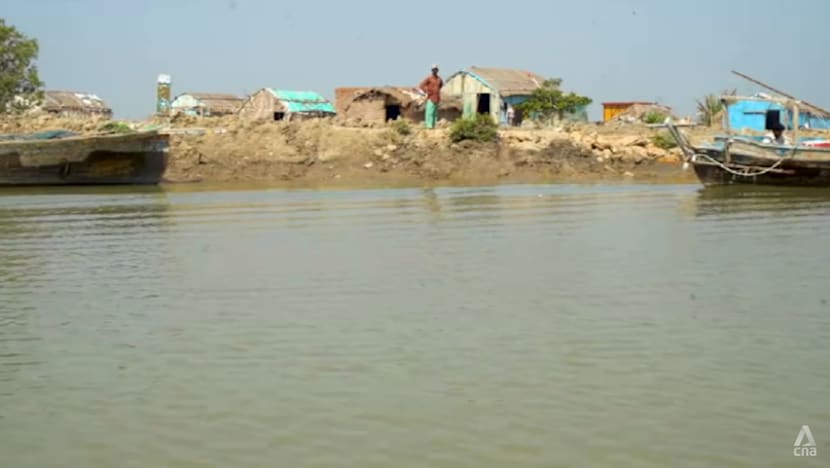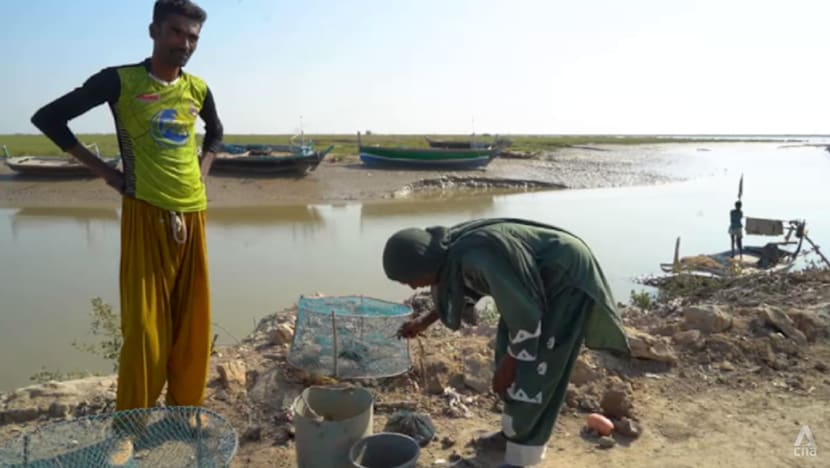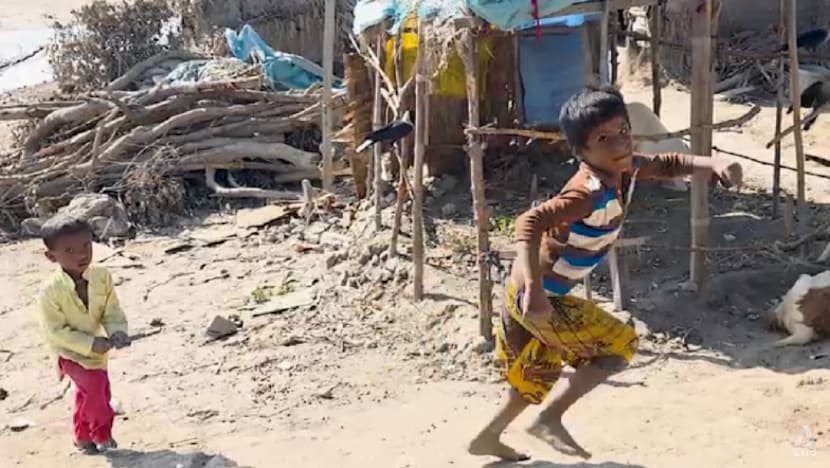Rising seas force Pakistan’s coastal communities to flee
An increasing number of Pakistanis are losing their homes as rising seas wipe out coastal villages and intrude into freshwater deltas.

Houses on the banks of the Indus River Delta in Pakistan.

This audio is generated by an AI tool.
SINDH: Fisherwoman Aminath Bibi was forced to abandon her coastal home in Mamu Dablu six months ago.
Her village, near the port town of Keti Bandar at the mouth of the Indus Delta in southern Pakistan, was once home to thriving fishing settlements.
But rising sea levels fuelled by climate change have steadily eaten away at the coastline, uprooting entire communities and driving them inland.
Now, all that remains are crumbling ruins of deserted huts standing amid the encroaching sea.
Aminath and her family of five relocated to Meeru Dablu, another village about 10km away. But freshwater is scarce there, and fishing – once their main livelihood – is no longer viable.
“We face a lot of trouble when the water level drops. It becomes hard to catch fish and we struggle to feed our children,” she told CNA.

She is among a growing number of Pakistanis who have lost their homes as rising seas infiltrate the delta and engulf coastal communities.
The country faces a growing challenge from climate-induced migration, which could internally displace nearly 2 million people within the next 25 years.
AN ECOSYSTEM UNDER SIEGE
The Indus River, which flows into the Arabian Sea, is the world’s fifth-largest delta system and is home to the seventh-largest mangrove forest.
Its unique ecosystem is now under threat from erratic weather patterns and human activity.
Rising sea levels are driving higher storm surges, erosion and flooding, according to the World Wide Fund for Nature (WWF)-Pakistan.
“Sea intrusion is one of the biggest threats to the Indus Delta (and) has been affecting the delta for the past two decades,” said M Ali Anjum, coordinator for WWF-Pakistan’s freshwater and conservation programme.
Experts say the causes are a combination of irrigation projects, hydropower development, and the effects of climate change on glacial melt and rainfall patterns.
As seawater seeps into the delta, it contaminates underground water sources and threatens the survival of many species
Salinity levels have surged, while the flow of freshwater into the delta has fallen by nearly 80 per cent since the 1950s.
LOOMING THREATS
It is not just coastal communities that are affected – the threat extends further inland.
Experts warn that Sindh’s capital, Karachi, could soon feel the impact.
Karachi, Pakistan’s largest city with a population of about 20 million, is already grappling with rising temperatures. It is also prone to flooding, with inadequate drainage infrastructure often overwhelmed during heavy monsoon rains.
“Karachi is already packed, and Karachi's absorption capacity is nearly zero. So, (if something happens), people will have to migrate to other cities,” said Masood Loha, founder of Clifton Urban Forest, a project aimed at improving the city’s climatic conditions.

SAVING INDUS DELTA
Efforts to protect coastal communities and livelihoods in Sindh began years ago.
One of the most ambitious is the Delta Blue Carbon project, launched in 2015 to restore the delta’s vast mangrove forests.
“During the last 25 to 30 years, the mangrove cover has been enhanced 300 times,” said Shehzad Sadiq Gill, a Sindh divisional forest officer.
WWF-Pakistan has also distributed mangrove seeds and saplings to local communities, encouraging them to plant and expand forest cover.
Mangroves not only provide a natural buffer against floods and coastal erosion but also serve as vital habitats for marine species.
Despite some successes, the fight remains an uphill battle.
Pakistan ranks among the top 10 countries most vulnerable to climate change. The United Nations estimates that flooding across Pakistan this year affected almost 7 million people, claimed more than 1,000 lives, wiped out 2 million ha of fertile land, and destroyed over 229,000 homes.
Experts warn that without urgent global action to reduce emissions and strengthen climate resilience, Pakistanis – along with other coastal and riverine communities around the world – will continue to pay the highest price.














